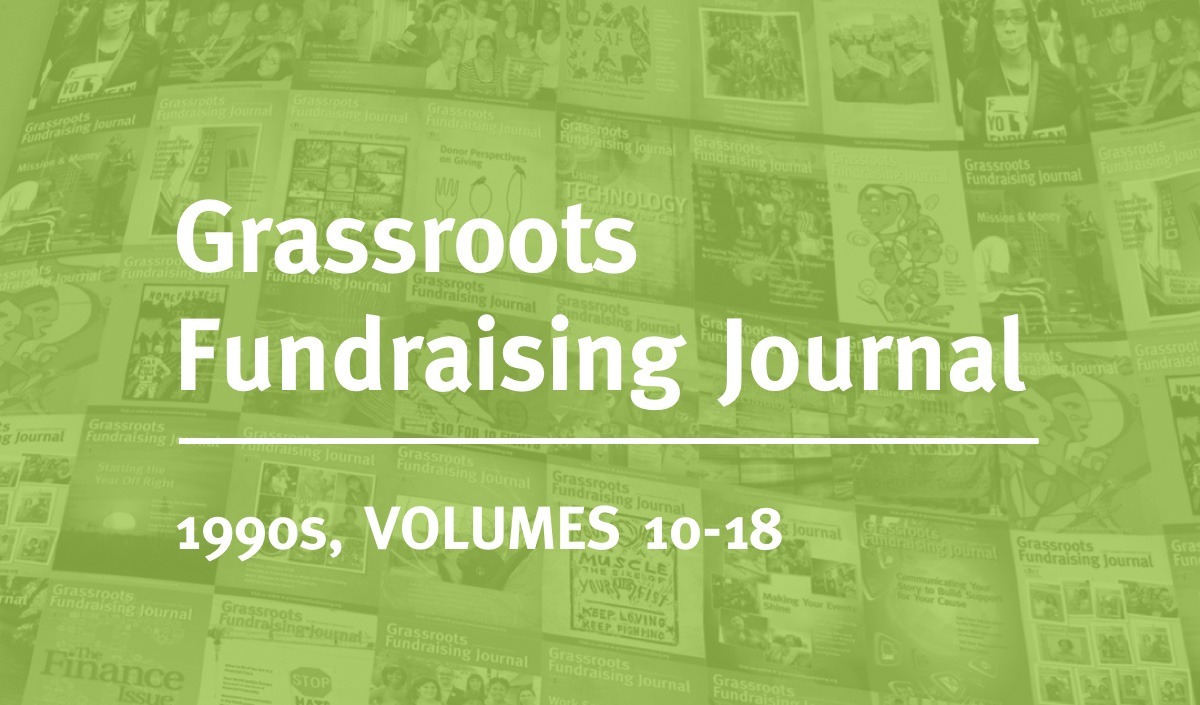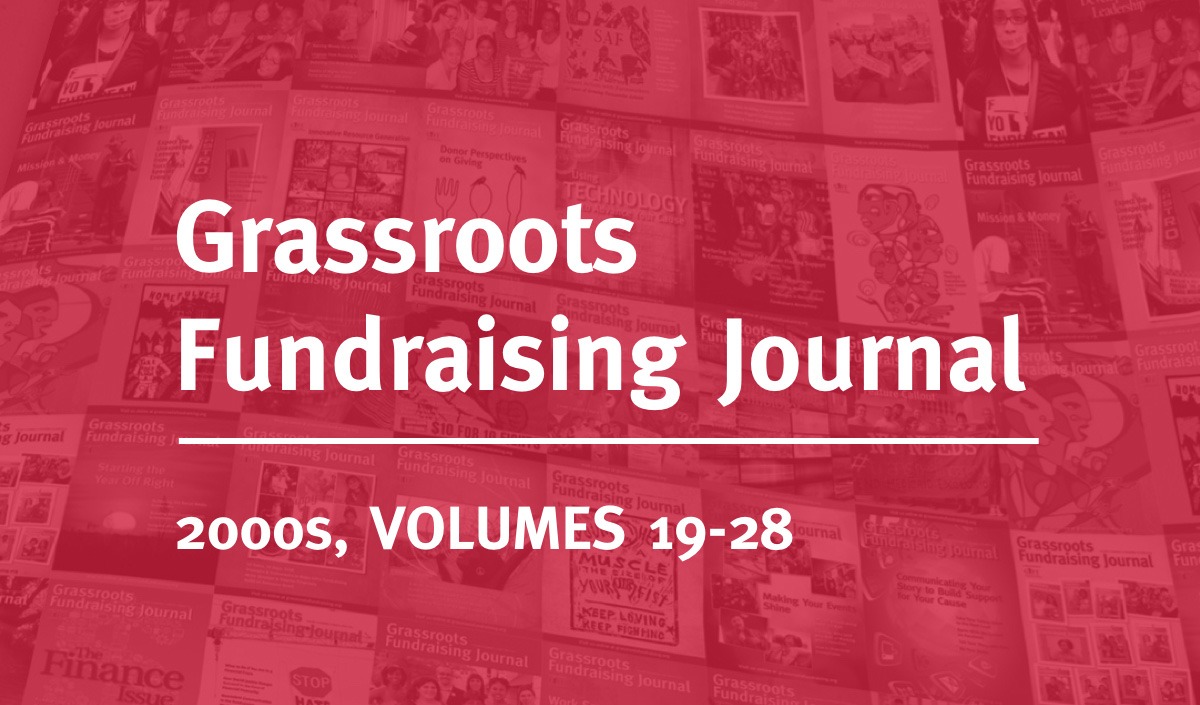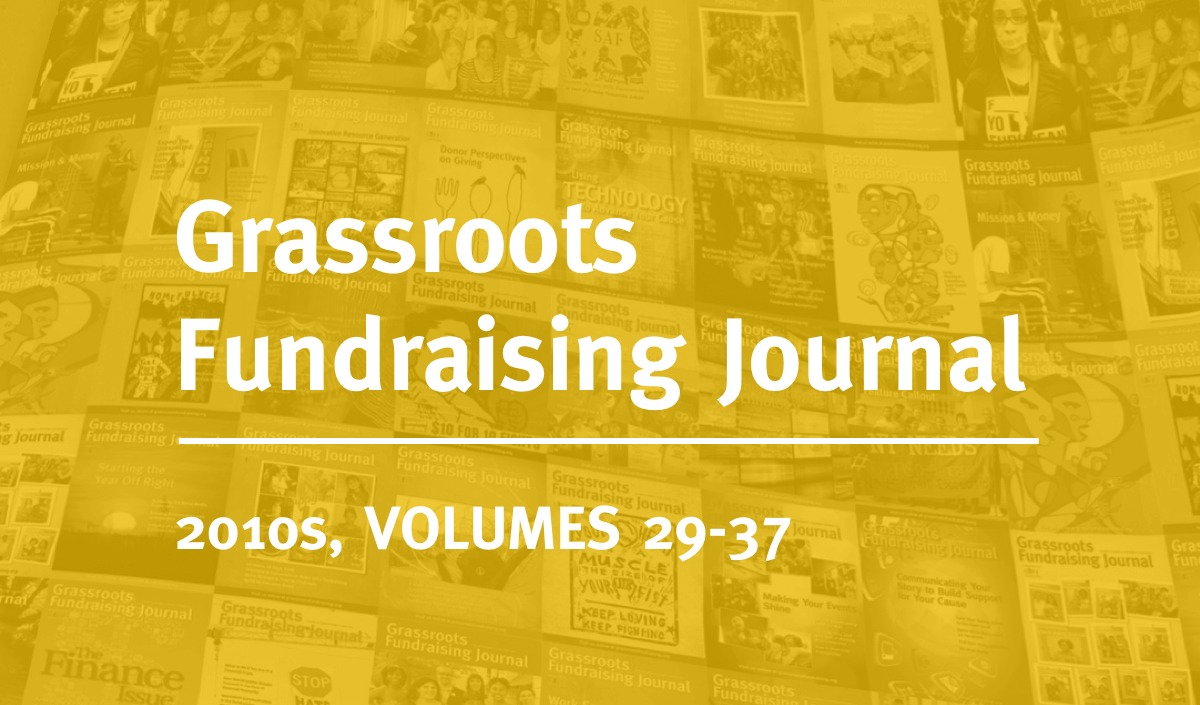
Editors’ note: This article, first published in print during June-1997, has been republished for Nonprofit Quarterly with minor updates.
With a gift-range chart, prospects, and a team of willing (or as willing as anyone ever is to ask for money) volunteers, the organization sets about soliciting major gifts. This effort could be a time-limited major gifts campaign or an ongoing part of its fundraising effort. The volunteers write or call the prospects to set up meetings with them, remembering that the most common word they will hear during this endeavor is “no.” Upwards of half of the prospects will not agree to meet; many will not even return phone calls. Other prospects will make a gift at the time of the phone call and a meeting will not be necessary.
For those meetings that do occur, conversation falls roughly into three content areas, with more or less interest by the prospect in any one area. These areas are the history of the organization, the philosophy of the organization’s work style, and the benefits to the prospect from giving.
History of the organization
This is important to a number of different kinds of prospects: those who think chronologically, who have had a long relationship with the organization or someone in it, who themselves have a history with the issue your organization is working on, or who have given before and want to hear what’s been happening since they made their gift.
Philosophy
This topic will come up with those wondering or want-ing to know more about why your organization chooses the methods it does to work on its issues. These prospects may question why you aren’t using other methods, or they may have questions about the people you serve and how you choose them. Or they may want to discuss any number of issues that involve values, commitments, beliefs, strategies, goals or objectives.
Benefits
Most prospects will want to know exactly how their money will be used, how many people you serve, what evidence exists that your organization has made any difference at all, what they will get by donating, how you plan to raise the rest of the money you need, etc.
Once you have covered these topics and answered the questions and objections of your prospect, as well as added what you think is exciting about the organization’s work, you are at the close—that is, you are ready to ask the prospect what financial commitment they are willing to make.
The Close
The close is just that—it’s when you finish talking and close your mouth. It is the natural extension of the conversa-tion you have been having with your prospect. Obviously, you are there to ask him or her for money. This is the time you do it. Your attitude must be as respectful at this moment as it has been throughout the conversation. You are asking a prospect for a donation, you are not “hitting them up,” “twisting the knife,” or hoping they will “cough up.”
At the close, you look the prospect straight in the eye and you say as confidently as possible, “Will you help with $500?” or, “Can I count on you for $1,000?” or, “We need ten gifts at$250. I think if you were the first, a lot of people would follow your example.” or, “Can you go as high as $1,000?”
There are no particular words that work better than other words. You need to find words that work for you—that you can imagine coming out of your mouth and that suit your personality. The only rule is that as part of the close you need to indicate a specific amount or range of money you want, whether or not you have talked about dollar amounts earlier.
Further, at some point in the meeting, and the close is a good place, you need to indicate that you have made your own gift. You can do this by saying, “I am hoping you will join me in giving…” or, “I decided to give when I learned that… “ or, “I am giving because…and I hope you will give also. Could you consider $…?”
If you do not want to say specifically what you have given, or even say directly that you have given, you can say, “The entire board has given a total of $____,” or even, “The entire board has given and now we are looking for support in the community.” If you are not on the board, you can say, “Board and close volunteers have already given $____, and now we must raise the rest from the community.” If you are a staff person asking for the gift, it may seem odd to speak from your role as a donor, but it is compelling to a prospect to know that you have made a gift in addition to working for a (probably) fairly low salary.
The Response
After you close, do not talk until after the prospect says something. No matter how long it seems, just sit still. It is not your turn to talk, and it is annoying to the prospect if you keep talking after you have closed. The time may seem longer than it really is because you are nervous. One friend says she breathes in and out slowly. With each breath in she says to herself, “He/she hasn’t said no,” and with each breath out, “I’m still alive.”
Listen Carefully
There are a standard variety of responses you can expect a prospect to make. Almost always the prospect will say some version of yes, some version of maybe or some version of no. Many people imagine scenarios worthy of a James Bond movie at the close, but what is the likelihood of a poisoned drink, mustard gas, the floor opening up and dropping you into a shark-infested pool, assassination or public humiliation at this point? After all, this person agreed to see you, conversed with you about your program for the last 30 minutes or so, knew why you were coming, and cares about your cause. Chances are you know this person or you know someone who knows them, so a slash-and-burn ending is quite unlikely.
Here, instead, are the more usual outcomes after the close, including the probable meaning of each response and some possible rejoinders.
Prospect: “Yes, I can do that.” Meaning: Yes, I can do that.
You: “That’s fantastic. Thank you. How would you like to pay that amount?” (Be happy and excited, but don’t be overjoyed and overwhelmed or you will give the prospect the impression that you have never handled gifts of this size before, or that you expected the prospect to be tighter with their money; you may wind up accidentally insulting the person.)
Prospect: “That’s a lot of money.” Meaning: The prospect wants to make sure you think it is a lot of money. He or she is not saying no or “I don’t have that much,” just, “Reassure me that this is as big a gift for the organization to receive as it is for me to give.”
You: “It is.” Or,“It is. That’s why I wanted to see you in person.”
Sign up for our free newsletters
Subscribe to NPQ's newsletters to have our top stories delivered directly to your inbox.
By signing up, you agree to our privacy policy and terms of use, and to receive messages from NPQ and our partners.
Prospect: ”I don’t think I can go that high,” or, “That’s out of my ballpark.” Meaning: You are on your way to a yes of some kind.
You: “We don’t need it all at once. Would you like to pledge and pay it over time?” Or, “What do you feel comfortable giving?” Or, “What would you like to give?”
Prospect: “I need to think about it.” Meaning: The traditional wisdom is that when a prospect says, “I need to think about it,” you have asked for exactly the right amount of money. It was not so little that he or she could give it at the moment or so much that it was out of the question. Your job is to set a date by which their thinking will be completed.
You: “That’s fine. Is there anything else I can tell you today that will help you with your decision?” If the prospect says no, then add,“We want to finish up this part of the campaign in the next two weeks. Can I call you in that time to see if you have had time to make a decision?” If the prospect says, “I’ll call you when I have decided,” say, “That’s great. Here’s how to reach me. Sometimes it’s hard to reach me, so if I don’t hear from you in ten days, I’ll call just to make sure we haven’t missed each other.”
Prospect: “I don’t think I can help right now.” Meaning: Unclear—perhaps the prospect has heard something he or she doesn’t like, or perhaps this is a bad time for them to give. But why would they have agreed to meet? Don’t agonize over all the possibilities. Simply ask the prospect what to do. You: “Do you want to pledge an amount and pay it later?” Or, “I know that feeling. How shall we leave it today—shall I get back to you? Do you want to make a pledge? “ If you think something else is going on say, “I could be totally misreading this situation, but I had the feeling you didn’t really agree with our program on X.” Show the prospect that it is OK for them to disagree or to have questions.
Prospect: “I need to talk it over with my wife/husband/partner.” Meaning: This is called the shadow question. It usually means the prospect has something specific to say or ask but feels embarrassed to do so, so unconsciously puts it on another person.
You: “I understand that. What do you think your wife/husband/partner will want to know?”
Prospect: “Well, she will wonder why you are spending so much money on rent,” or whatever. Answer the objection, “That’s a good question. We feel it is important to be near public transportation so we pay more to be downtown,” or whatever the answer is to the objection.
Prospect: “What if you don’t raise the rest of the money you need?” Meaning: I don’t want to feel foolish if I am the only one that gives to this program.
You: “We believe we can raise all the money we need because we have already raised X amount and we have a large team of people helping. The worst-case scenario is that we would have to delay starting the project by a couple of months if all the money isn’t in, but I don’t anticipate that happening.”
Prospect: “I’d like to help, but I want my money to be used only for X and not for Y.” Meaning: I need control, or I don’t trust the group entirely, or I am enjoying wielding my power right now. You will need to listen to the terms of the gift, and may have to get back to the person about whether you can accept the gift under these conditions.
You: Repeat back the condition to make sure you heard it correctly.“Let me just make sure I got this right. You are willing to make a gift of $____ to be used for X and not for Y.” If the prospect confirms these terms, say, “That’s very generous. I don’t have the authority to agree to that condition, but I can get back to you about it this afternoon.” Remember: you don’t need any money badly enough to agree to terms that are not good for your group.
Prospect: “No. I like a lot of what you do, but I don’t agree with X,” or, “I don’t think your approach is well thought through,” or “I don’t think you can raise the money you need.” Mean-ing: the prospect is not convinced, or you have talked yourself into and out of the gift, or the prospect has discovered something about your group he or she doesn’t like.
You: Make sure the prospect has understood you have said everything correctly. If so, you may have to be satisfied with “no.” Or, you may be able to clear up a misunderstanding to turn the “no” into a “maybe” and get back with the person.
After the Meeting
Before ending the meeting, verify what you think your agreement is with the prospect: “Thanks so much for your gift of $2,500. I’ll tell the director to expect it in a few days.” Or, “I look forward to talking with you in the next two weeks about your decision, and if you have any questions or need more information, just let me know.”
Then go back to your office and write a thank-you note. If the meeting brought up difficult issues, acknowledge this: “Thanks for being so candid today. Even though our discus-sion was difficult, I really appreciated your honesty and look forward to staying in touch.” Basically, you reiterate what you verified in the meeting. Keep a copy of your letter in case fol-low-up is needed.
Make some notes about what happened at the meeting. What did you learn about this prospect that will be helpful to another person who may be asking them in the future? What were their interests and concerns? What were their questions and what skills do they have that might be helpful to the organization? You might also include information about the prospect’s age, family, job, and other interests you may have learned about.
The close is not truly over until the thank-you note is written and sent and all necessary follow-up is completed. But the exciting, hair-raising, anxiety-producing part of the close is definitely over once you ask for the gift.









